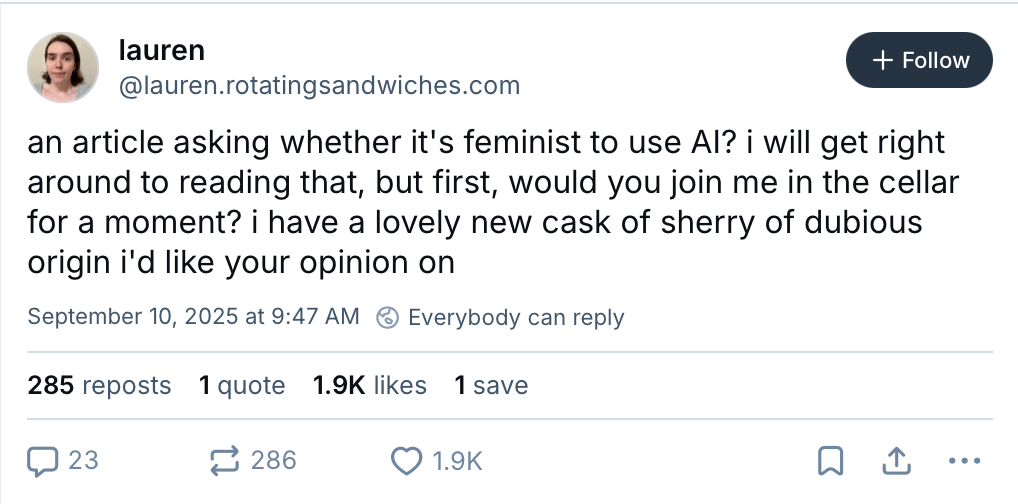Breaking Rocks in the Hot Sun

I was feeling much better, thank you very much, until this country took another grotesque lurch towards fascism midweek.
I think it had helped, if I'm perfectly honest, that Kin and I had finally completed our re-watching of all six seasons of The Sopranos. As I've written previously, I've viewed the first couple of seasons multiple times, but never made it all the way through a second time. And well before the Season 5's "Long Term Parking" (which we must've reached by last Friday or so. The title of this episode has stuck with me since I first watched it) things were going very very poorly for Tony Soprano and family ("Family"). My mood has followed their downturn in fortune. But I'd truly forgotten how poorly things would get for Tony's son A.J., in particular, in the show's final season – how he is gripped with such debilitating depression, how he tries to drown himself in the backyard pool, how he wails and cries.
It's been "triggering," as they say. The character reminded me so much of Isaiah, young Robert Iler looking so much like Isaiah did in his early 20s. (Isaiah would've been 13 or so when the final season first aired.) And between A.J.'s depression and Christopher Moltisanti's heroin usage, there was a lot that was, well, a lot.
So no wonder I've been sucked into my own deep sadness while watching this show I ostensibly loved, I suppose, particularly as its original broadcast back in the 2000s coincided with some of the most challenging times in my own life (up til that point, at least): graduate school, Anthony's cancer, Anthony's death. I'd rented the DVDs from Blockbuster in order to view the first seasons; Anthony was still alive then. But he'd died before the show ended, and I remember paying for cable, paying for HBO for the first time in my adult life just so I could watch the final season – one of those indulgences that confuse "consumption" and "self-care." Did Isaiah watch the show with me? I don't recall. Did I think of my own son when watching Tony Soprano's struggles back in 2005? I don't remember. Did I think about the theme of generational trauma back then? I don't think so. I really didn't have any personal experience with therapy at the time either – just some grad school knowledge of psychoanalysis as cultural theory. Lacan. Freud.
Funny how I've spent the last few decades not just in (and out of) therapy, but immersed in (maybe "angrily adjacent to" is a better prepositional phrase) educational psychology. "Funny."
We can't always disentangle fact and fiction. Theory and praxis. We read ourselves into the storyline. We respond to its contours based on our own emotions, our own experiences. We can see a movie, read a book over and over again and see something new each time because we're different each time.
I was feeling much better, thank you very much, until this country took another grotesque lurch towards fascism midweek. I think it helped, if I'm honest, that I'm back to reading books and not watching television.
Kin and I are listening to Megan Greenwell's book Bad Company on private equity "and the death of the American dream." (Note to self: take a look at how private equity has screwed up education.) I've also started Laura Delano's memoir Unshrunk about her experiences with the mental health industry – pharmaceuticals, therapy – and what's called "several psychiatric treatment resistance."
I've also found myself reading some detective fiction – not sure why the genre is suddenly appealing. Joanne the TERF has a new book out oh hahahaha under a male nom de plume what a hypocritical piece of shit that woman is). It's the latest in her Cormoran Strike series. Strike's an interesting enough character, but I wanted to read a detective novel that didn't subsidize fascism. Is there such a thing? I don't know. I've started Case Histories by Kate Atkinson, without googling to see if she's awful too.
Detective novels, WTF?
Perhaps it's the search for closure, for answers.
Novels gave you a completely false idea about life, they told lies and they implied there were endings when in reality there were no endings, everything just went on and on and on. – Kate Atkinson, Case Histories
The novel is a collection of lies, a hallucination even. Generative AI offers none of that: it's a bullshit machine, a predictive text-extruder that, like the proverbial broken clock, can sometimes be correct. It never hallucinates because androids do not dream, not of electric sheep, not of anything at all.
If I'm looking to be lied to – sweet sweet reassuring fiction – I'd rather look to a novel for that than to ChatGPT. But that's just silly ol' me, preferring humanity, preferring the imagination. And also preferring books to TV (although I hear there's a TV series based on Atkinson's detective, Jackson Brodie. Sigh.)
I was feeling much better, thank you very much, until this country took another grotesque lurch towards fascism midweek.
Indeed, when I started to review all the links I'd gathered for Friday's Second Breakfast newsletter, I noticed that there seemed to be a definite drop in the number of AI-boosting stories. Oh, there's still plenty of BS, to be sure – lots of folks are heavily invested (financially, and yikes, emotionally) in the future being full of automated thinking and text-extrusion, I reckon. Lots of folks have paid for an annual subscription (or god forbid, signed longer term contracts); lots of folks have consulting hours to bill, keynote speeches to secure.
I mostly didn't write about "AI" in Friday's newsletter; there were other more pressing things to discuss -- still connected to "ed-tech," as I noted -- but less wrapped up in the recent futurist fantasies of image-, text-, code-"generation." (Indeed, Charlie Kirk's alleged killer seems to have embraced a kind of "doom" that even the "AI doomers" don't peddle.)
Some of the stories I left out:
- "Should AI Get Legal Rights?" asks Wired. Fascinating that, as the country does everything to take away the rights of women, people of color, people with disabilities, queer and trans people, immigrants, workers, and on and on, there are people who have the gumption to ask if we should extend legal rights to a product.
- "Why AI Coding Claims Don't Add Up," according to Mike Judge. I've read a lot recently about how “AI” has already taken over the jobs of programmers, particularly young programmers -- to which I always retort that robots do not “come for your job”; management does. “AI” is obviously being sold as a productivity booster: as a time-saver, a money-saver, a labor-saver. And that all means, to those in charge, the ability to axe jobs. I remain unconvinced that what we see in the job numbers, or in Judge’s case, in the app output, is a result of technology as much as a result of austerity.
- “The most radical act of feminism? Using AI,” says Josie Cox. JFC, that’s a bad take, and it wasn’t even in the Top 20 bad takes for a week – that’s how bad that grotesque lurch towards fascism midweek lurched.

- Henry Farrell wrote about “Understanding AI as a social technology,” and Arvind Narayanan and Sayash Kapoor tried to clarify their arguments about AI as a “normal technology.” I really dislike the latter framing, and I keep saying I’m going to write more about this but I haven’t, have I. But for now, there's this from Ben Recht: "How Snake Oil Becomes Normal Technology: A Brief History of American Capitalism."
- “OpenAI Says It Will Burn $115 Billion Through 2029,” The Information reports. No comment.
- The Authors Guild penned its article, “What Authors Need to Know About the $1.5 Billion Anthropic Settlement,” before Judge Alsup raised an eyebrow at the settlement, so it’s not clear it’s a done deal. (Wired’s Steven Levy just published this -- "I Wasn’t Sure I Wanted Anthropic to Pay Me for My Books — I Do Now” -- and when you’ve lost Steven Levy...)
- Claire McNear tells the story of IBM Watson’s appearance on Jeopardy, which she calls “a prime-time preview of the anxious, angry moment we’re in now.”
- Cory Doctorow wrote an essay on "reverse centaurs" and "AI": "There's a bit of automation theory jargon that I simply adore: 'centaurs' and 'reverse-centaurs.' A centaur is a human being who is assisted by a machine that does some onerous task (like transcribing 40 hours of podcasts). A reverse-centaur is a machine that is assisted by a human being, who is expected to work at the machine’s pace." I think there's something worth thinking about more here regarding education certainly, but also gendered labor. My god, this whole newsletter is full of "I need to write about this but I haven't. But I can't."
- Viola Zhou’s article, “My mom and Dr. DeepSeek” explores the growing use of chatbots in China (and elsewhere) by those dealing with illness and isolation. (Related: a recent episode of the This Machine Kills podcast in which hosts Edward Ongweso Jr and Jathan Sadowski talk about Eric Schmidt and the US versus China framing of AGI as a national security issue.) Again -- and as in education -- perhaps it’s less that “AI” is an incredibly doctor and more that we have asked healthcare professionals to “do more with less.” Austerity makes “AI” appear so loving because our institutions do not care at all.
I was feeling much better, thank you very much, until this country took another grotesque lurch towards fascism midweek.
I was sort of surprised to see one prominent education newsletter, in its review of the week's news, declare that the most important story was the release of NAEP scores. The country took another grotesque lurch towards fascism with an event that literally took place at a school, and folks want to point to standardized testing as a meaningful signal about children?!
I was feeling much better, thank you very much, until this country took another grotesque lurch towards fascism midweek.
Is it techno-fascism? Or is it Christian nationalism? (And the perpetual question I ask: how does this relate to education, to education technology, to "AI"?)
- "Antichrist or Armageddon? Peter Thiel rethinks apocalypse from Silicon Valley"
- "Fantasy or faith? One company's AI-generated Bible content stirs controversy"
I still think Judith Butler's book Who's Afraid of Gender? offers some of the best analysis of our current situation which is so clearly bound up in reasserting a patriarchal order, in policing gender expression, policing and punishing bodies, policing and punishing trans people. I mean, of course Butler is the go-to person on gender theory.
But I think what they say about reading is really crucial, particularly when we think of the attacks on library books and on school curriculum relating to LGBTQ+ issues and authors. How do Christian nationalists, how to techno-fascists (and "AI" advocates) view reading, how do they view authority in texts? Not "truth." Authority.
It is tempting to try to expose and puncture this inflammatory caricature of gender through an intellectual exercise. As an educator, I am inclined to say, “Let’s read some key texts in gender studies together and see what gender does and does not mean and whether the caricature holds up.” We would then hope to deflate the exaggerated phantasm by testing it against the actual texts in which gender is discussed, the actual policies in which it is used. Sadly, such a strategy rarely works. Advocates of the anti-gender position (those who construe gender as an “ideology”) think they have to do away with gender — the field, the concept, the social reality — precisely because they will not read the scholarship on gender that they oppose, refusing, sometimes as a matter of principle, to engage in grounded forms of criticism. Their anti-intellectualism, their distrust of the academy, is at the same time a refusal to enter into public debate. What is dismissed as “academic” procedure is actually required for informed public deliberations in democracies. Informed public debate becomes impossible when some parties refuse to read the material under dispute. Reading is not just a pastime or a luxury, but a precondition of democratic life, one of the practices that keep debate and disagreement grounded, focused, and productive. Further, the anti-gender advocates are largely committed to not reading critically because they imagine that reading would expose them—or subjugate them—to a doctrine to which they have, from the start, levied objections.
Further, the anti-gender advocates are largely committed to not reading critically because they imagine that reading would expose them — or subjugate them — to a doctrine to which they have, from the start, levied objections. (emphasis mine)
The implicit logic here seems to be that if my opponents are reading in the way I read, and reading is submission to the authority of a text, or set of texts, considered to be unified in their message and authoritative, then gender critics are like their conservative Christian critics, except that each submits to a different dogma. It follows that the gender critics imagine that their opponents read gender theory as they themselves read the Bible, or blindly accept as they do the pronouncements of their preferred authorities. In their excited imagining, gender theory relies on wrongheaded texts authored by false, often intangible authorities who wield a rival and parallel power to biblical authority and compel a similar sort of submission to its claims. (emphasis mine)
Apparently, then, gender is construed as an “ideology” because those who read books about gender are ostensibly subjected to their dogma and do not think independently or critically. The opposition to including books on gender in schools and universities, the new efforts to expunge the curricula of such topics, rests on a certain distrust of reading and its capacity to open the mind to new possibilities. On the one hand, the mind should not be open to rethinking how sexuality or gender is socially organized, or how we refer to people more generally. The mind should apparently remain shut in that regard. On the other hand, the mind should be kept free of ideologues who would, apparently, engage in recruitment efforts, nefarious forms of seduction, or even engage in brainwashing.
I'm quoting too much Butler here. Their name was among those the University of California at Berkeley turned over to the Trump Administration. Ah, the professor watch list – Kirk's legacy lives on, no doubt. Watch this country honor that empty man's memory by suppressing the rights of marginalized people, by censuring speech in the name of protecting speech, but really simply protecting white supremacist patriarchy.
My point (or JB's point, rather) in that long excerpt: You can't debate people who will not read because there is only one book, only one authority... except for all the AI slop they're consuming, all the Christian nationalist podcasts and propaganda videos they're flipping through because they like the authority that comes with a retrenchment of patriarchal white supremacy of course. Because they haven't even read the damn Bible, I bet. Not really. It's just another meme.
This isn't about discourse or politics, I fear, not in the way in which we've traditionally conceived of such things. This is about The End, as powerful right wing men would have it. Both the techno-authoriatians and the Christian nationalists lean into that.
Excuse me while I laugh in the fucking face of the "AI Literacy" crowd here, their insisting that they've got a good plan to save the children. It's a manic laugh, a bit mad. But the outburst will make me feel better, if just for a brief brief moment.
I was feeling much better, thank you very much, until this country took another grotesque lurch towards fascism midweek. I can't even separate what's depression and what's anxiety and what's a healthy, appropriate response to all the monstrosity.
I was feeling much better though. I was.





